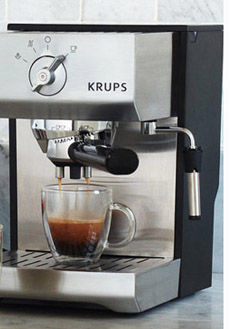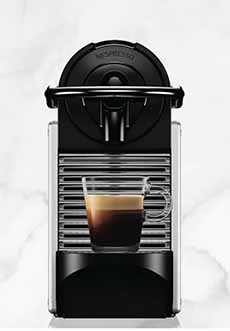|

[1] While this moka pot makes strong Greek or Turkish coffee, it is not an espresso machine (photo © Andres Vera | Unsplash).

[2] This is a home espresso machine adapted from a professional model that forces pressure through the spigot (photo © Krups).

[3] Another home version uses capsules to make an almost-as-good cup of espresso as the larger models (photo © Nespresso).
|
|
There’s National Coffee Day and National Coffee Month, but November 23rd celebrates a specific type of coffee. It’s National Espresso Day. What is espresso, and how does it differ from coffee in general?
One of the primary differences between coffee and espresso is how they are made. Trade, a coffee trade association, tells us that:
For most other coffee brewing methods, the extraction process takes place over a moderate amount of time (4–5 minutes) either by full-immersion steeping, like in a French press, or through a kind of progressive extraction aided by the force of gravity, like with a pour-over or drip brewer.
Espresso, on the other hand, is brewed using the force of significant additional pressure. (Think of the “press” in “espresso” as a reminder.)
In the original days of espresso coffee, this pressure was created using steam power.
Today, most modern espresso machines use electric pumps that can force water through the bed of coffee grounds at 9 atmospheric bars of pressure, or about 130 pounds.
This pressurized brewing allows the extraction to happen much faster, typically between 20 and 30 seconds.
And that pressure and extraction is the key difference.
In addition, espresso is a concentrate; coffee is diluted.
Espresso is also brewed as a concentrate, meaning there is less water and more coffee flavor in the finished beverage. That’s why the taste is stronger (although ounce-for-ounce, the caffeine is the same).
While you can certainly brew a stronger, or more concentrated, cup of drip, French press coffee, or moka pot (photo #1) or use dark roast or French roast capsules in a K-cup machine, your final product will likely contain less than 2% of extracted coffee.
An espresso, on the other hand, generally contains between 10%–13% extracted coffee.
MORE ABOUT ESPRESSO
The history of espresso.
The different types of espresso drinks.
ESPRESSO RECIPES
Affogato: An Ice Cream Pour-Over
Dalgona Whipped Coffee
Espresso Cocktails
Espresso Ice Cream Shooters
Espresso Mousse In Espresso Cups
Irish Espresso (Irish Coffee Shots)
Kahlua Espresso Martini
Pumpkin Spice Latte Ice Cream Pops
Spiked Iced Coffee & Iced Espresso
Plus
Why you should consider a sparkling water chaser.
|




